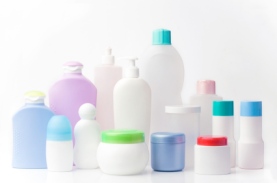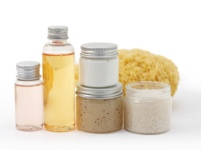The Case for Safe Cosmetics
Why are safe cosmetics so important?
Think for a second about all the body care products you and your loved ones use.
All that soap, body wash, shampoo, conditioner, shaving cream, deodorant, toothpaste, mouthwash, perfume/cologne, moisturizer, makeup, hair styling products, nail polish, hair dye and others.

Do you really have any idea what are in these products? Most of us don't. Just look at those incredibly long ingredient labels.
How many ingredients can you actually identify? Or simply pronounce for that matter?
If you're not worried about what's in these products, you should be.
Most of these cosmetics contain ingredients that are known to or strongly suspected to cause:
- cancer
- endocrine disruption
- reproductive disorders
- birth defects
- immune system toxicity
- organ toxicity
- neurotoxicity
- asthma
- skin irritation
- and other hazardous health effects
Using these products day after day is much more damaging than eating conventionally grown food. An apple might only have a little bit of pesticide residue. But that conventional bottle of body wash has harmful chemicals as its MAIN ingredients.
Yes, it is more important to use safe cosmetics than eat organically-grown food. Yet most of us eating organic foods don't think twice about the products in our bathroom.
Perhaps it's because we expect the FDA to protect us from unscrupulous companies. But they aren't.
These quotes are taken directly from FDA's Office of Cosmetics and Colors Website:
- "Cosmetic firms are responsible for substantiating the safety of their products and ingredients before marketing."
- "FDA does not have the resources or authority under the law for pre-market approval of cosmetic product labeling. It is the manufacturer's and/or distributor's responsibility to ensure that products are labeled properly."
- "A manufacturer may use any ingredient in the formulation of a cosmetic provided that the ingredient and the finished cosmetic are safe and properly labeled."
- "Manufacturers are not required to register their cosmetic establishments, file data on ingredients, or report cosmetic-related injuries to FDA."
- "FDA is not authorized to require recalls of cosmetics but does monitor companies that conduct a product recall and may request a product recall if the firm is not willing to remove dangerous products from the market without FDA's written request."
So essentially, the FDA is allowing cosmetic companies to regulate themselves. So much so that they have not even defined the word "SAFE." So companies can come up with their own definition!

Other countries are far ahead of the U.S. in making sure that their citizens have access to safe cosmetics.
The European Union has banned over 1,000 chemicals from personal care products.
How many has the FDA banned?
Eight. Yes, only eight.
So those other personal care ingredients that European countries have banned are still in products being sold to U.S. citizens. They're even commonly found in many of our baby care products.
Feeling outraged yet? Hopefully all of this information makes you want to search out safe cosmetics. Unfortunately, it is not easy. Manufacturers use all kinds of tricky language and tactics to make their products appear safer and more natural than they are.
Products labeled "organic" and "all natural" frequently are not.
Learn about these tricks on my organic body products page.
You can also check out more about safe cosmetics on the non-profit organization Skin Deep. Look up the current body care products you use and find out what harmful ingredients are in them. It's a real eye-opener.
For a list of body care products that I use myself, see this page on non-toxic cosmetics.